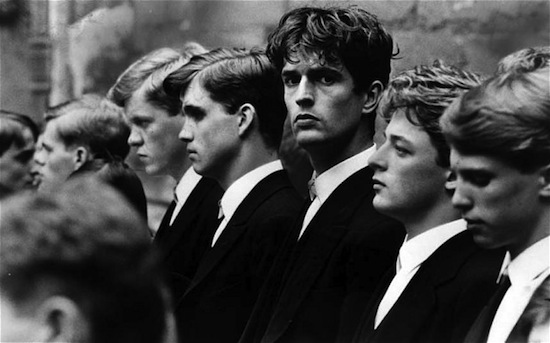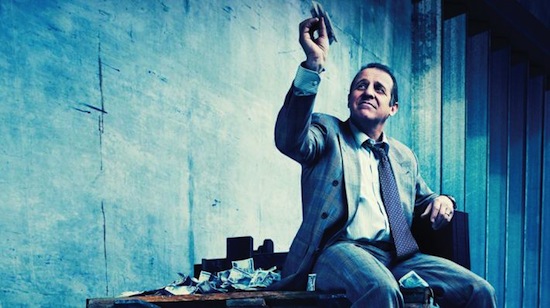The theatre that will always count is the plays that continue to be pertinent no matter when they are performed. They can slide into any place or time and feel as though they were written in direct response to something that happened yesterday, and yet act also as a comment on hundred-year-old events.
A Small Family Business by Alan Ayckbourn and Another Country by Julian Mitchell are two such plays – the former an early comment on Thatcherite individualism that feels only banal in its familiarity, the latter an insight into the self-selecting elite that graduate from British public schools and sidle into government cabinet posts. Both plays, in their critiques of conservative values, draw on themes of corruption and the obsolescence of tradition. They show us systems that chug along undisturbed, rewarding villains and perpetuating social inequality.
Their continued relevance, then, is nothing to celebrate: we meet it with a grim recognition and an understanding that great theatre is often only possible through individual and collective failure.
Another Country, at Trafalgar Studios, introduces us to a set of public schoolboys in the 1930s. Even at that time, it is becoming apparent that the rules and traditions that dominate their daily lives are becoming quickly irrelevant in a post-war world. Hierarchies and emotional repression don’t seem to fit into a society where millions of young men lost their lives in a pointless war, and there is a divide in the common room between the obedient prefects and the cautious rebels.
One student in particular, Tommy Judd (Will Attenborough), has a head full of communist ideas and claims to have lost twelve torches whilst reading Karl Marx after lights out. His best friend, Guy Bennett (Rob Callender), is merely concerned with the pursuit of pleasure, and his flamboyant disregard for convention and openness about his homosexuality are just as radical as Judd’s commitment to communism.
The catalyst for action is the news that a pupil, Martineau, has committed suicide after being caught with another boy – standard practice behind the scenes, but not something any of the boys want to become wider knowledge. Their house is thrown into disarray, and the older prefects, led by Fowler (Rowan Polonski), resolve to put an end to the debauched behaviour. "Things have got so slack," he laments, pacing around with grenade-like anger.
Petty politics abound, and the boys tussle over who will be allowed into Twenty-Two the following year, an ultra-prestigious group of the very best in the school. Bennett has long dreamed of being inducted, but a promise to that effect falls under question as the fight to rub out ‘immoral’ behaviour intensifies. It quickly becomes a game of negotiation and strategy to ensure that bullies and bad eggs will not populate Twenty-Two.
Judd’s friends call upon him to put himself forward for the role of prefect, a prospect his conscience cannot quite come to terms with. "I can’t be against the class system AND be a prefect." There is a lot of comedy in Judd’s earnest but naïve commitment to communism, but there is also a safeness about it that makes it problematic: from his position of extreme privilege, Judd polemicises about the proletariat and talks about resisting tradition – despite being mired in tradition up to his eyeballs as he muses from the comfort of the old boy network. He tells the young and nervous Wharton (Bill Milner), who has been affected by Martineau’s suicide, that suicide is the result of capitalism, and that in a properly structured society it couldn’t happen. "[There are] people who have power over us, and they don’t let us be who we want to be."
But surely from his vantage point of the upper classes, it is far less likely that Judd is unable to be the person that he wants to be. Despite his sincere attempts to engage in a radical left wing ideology, he cannot identify his own complicity. There is a sense throughout that Judd is doomed – so idealistic that his eventual inevitable cynicism can be nothing short of a tragedy. And when he does concede to the demands of his friends to take up the position of prefect, he tells Bennett that betraying his values has been "a purely logical", as opposed to emotional, decision. Yet, this is untrue: it a decision compelled by the loyalty and love of his friends.
Bennett’s stance is entirely opposed to Judd’s: he is guided by his emotions, and uninterested in the discussion of ‘ideas’. All of his classmates, excepting Judd, have had a clandestine encounter with him at some point, and all want to bring him down for this reason. Whilst the other boys mutter with embarrassment, "I don’t believe in talking about it," and insist that it is "a passing phase, all the books say so," Bennett has come to understand that his homosexuality is not an eccentric facet of public school life, but a core part of his identity.
Whilst Judd believes that personal feelings are "irrelevant", Bennett’s courage to turn against the out-dated traditions of the school stem from the pain he feels at being outcast for his sexuality. He recognises a contradiction in Judd’s supposedly-progressive outlook: "In spite of your talk of equality and fraternity, you still believe some people are better than others because of the way they make love."
Mitchell, having based the play around the story of the Cambridge spies, suggests that it is Bennett’s (read: Guy Burgess’s) desire to get revenge on those who rejected him that led him to betray his country. He did not possess the radical political convictions of his friend Judd, but wanted to inflict an injury on those who had carelessly done the same to him.
Observations that Mitchell demonstrates the public school life was all ‘just a bit peculiar’ sorely miss the point: what he indicates is that, charming as these characters can be, the rest of the world lives and dies by the loyalties, betrayals and emotional whims of a small self-serving elite.
There is no fault to be found in this production of Another Country: it’s as immaculate as these grasping schoolboys erroneously believe the image of their public school is.

Neither are appearances all they seem in Alan Ayckbourn’s A Small Family Business, currently playing in the National’s Olivier. A stunning set holds a large detached red-brick house: this same building acts as the home of the play’s multiple families, suggesting the bland uniformity of consumerism, and the domestication of corruption.
Whereas Another Country showed us the attempt to maintain tradition in the face of a society hurtling towards more progressive values, Ayckbourn’s play provides a struggle between upholding traditional family values in an age of insatiable personal greed.
Michael Billington agreed with Ayckbourn’s biographer, Paul Allen, that this was ‘the central political play of the decade’ in the 1980s. He did concede there was little to choose from, since the money-driven ‘bums on seats’ mood of the time made it difficult to find much intellectual stimulation amongst what was on offer: singing trains, singing cats, singing disfigured opera stars and singing Vietnamese children.
A ridiculously-funny opening scene shows Jack McCracken (Nigel Lindsay) arrive home to a surprise party: the cause for celebration is that he has just inherited the family business. Amongst his relatives, Jack proceeds to make a speech about his hopes for the future of the business. He wants the company to be driven by values of hard work, effort, and above all, honesty. "It must no longer be a question of take take take," he says. "We’re a small family business – the same as always."
Ayckbourn knew that this elevation of family values formed a central part of Margaret Thatcher’s sanctimonious moral agenda – but it also was totally at odds with her unerring promotion of the pursuit of individual profit.
Jack’s principles are regarded by his family as some sort of whimsical quirk in his personality. His wife berates him for his inscrutability: "I’m married to a successful man and we’re living like failures," she says, before suggesting "everyone works little fiddles – it’s what the system allows for." His daughter Tina talks about how she used to steal when her and her husband was hard up, before confessing that "I resented paying."
It soon becomes clear that the rest of Jack’s family don’t share his pristine morals, and a slimy store detective, Benedict Hough, comes round to inform him that his daughter has been caught shoplifting. In order to stop him from pressing charges, Jack is blackmailed into giving Hough a job – and Hough quickly uncovers that the family business is being destroyed at the expense of the rest of the family’s illegal furniture selling racket.
Ayckbourn’s language reflects a society where everything has an economic worth: Jack’s brother Cliff describes his wife Anita as "expensive", whereas she makes it clear that her five extra-marital Italian lovers are mere accessories when she coos, "I love this one best of all." Brother-in-law and business partner Desmond is plotting to set up a business in Menorca, an up and coming capitalist utopia of hedonism and consumption, whilst his unhappy wife resolves to "have him for every penny".
It’s perhaps a little predictable that Jack quickly descends into the world of fiddling and lying populated by his relatives. When it becomes clear that incoming employee Benedict Hough now knows far too much about their corrupt behaviour, they attempt to buy him off – but it’s not enough. "I’m eminently corruptible but I at least have a good sense of my self-worth," he replies.
However, what transpires reveals a darker side to Ayckbourn’s writing that the twee, unsubtle nature of the farce genre does not usually allow. As such, the tone can’t help but feel rather confused; events that surely aren’t designed to provide mirth left people rolling about in the aisles.
Nevertheless, there is a chilling uneasiness to the final scene’s circularity, suggesting a descent into crime and corruption is mundane and unremarkable. Ayckbourn’s plays may be flamboyant and over-the-top in their plotting, but here the message is clear: in the age of Thatcherism, and now beyond, greed and cruelty are personality traits so common that they fade into the plain fabric of everyday life.
What both plays share, despite their common themes of corruption, tradition and individualism, is that their characters are guided by ideology, whether they like it or not. In Another Country, the seemingly-immovable set of rules and structures maintained by the bourgeoisie begins to come up against the radical philosophy of communism, whilst A Small Family Business shows us the rapid implementation of a neo-liberal ideology that makes space for no others.
Tony Blair suggested that ideology, when couched in economic and social theory, was dead – "and its passing causes little regret". The world that Ayckbourn imagined, where someone could love their Porsche more than their wife, has since only accelerated in intensity, and Blair’s words attempt to give credence to the idea that we could sooner imagine the end of the world than the end of capitalism. But as Slavoj Žižek suggests, "the highest form of ideology is that which presents itself as empirical fact". Ayckbourn’s prognosis for both then and now is bleak, but Mitchell hits on a glimmer of hope, which has long been snuffed out: the past really is another country – a place where they do things differently, or at least imagine that we might be able to.
A Small Family Business is showing at The National Theatre until August 2014, and Another Country is booking at Trafalgar Studios until June


